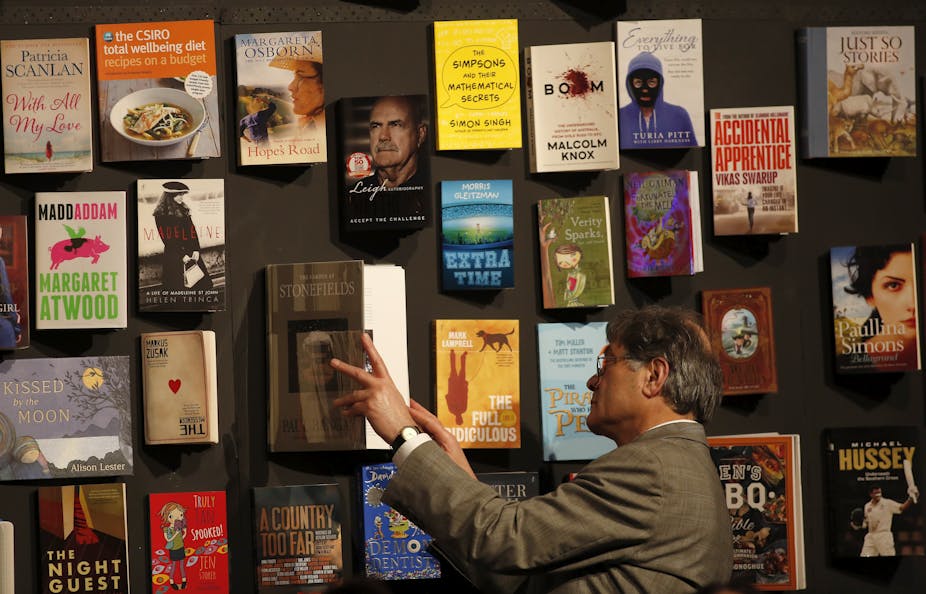October is the biggest month of the year for those in the literary world.
This year, the Nobel Prize for Literature awarded to Patrick Modiano and the Man Booker Prize, to Richard Flanagan for The Narrow Road to the Deep North, attracted a flurry of discussion, as always, about the prizes and whether the judging panels “got it right”.
But if the two most influential annual literary prizes are an indication of the contemporary canon, this is an opportune moment to think about the role of literature and reading, about what we value, now.
Prize-winning books are not just well-written, even though American critic Harold Bloom, the man who put himself in charge of the canon, emphasised aesthetic quality as the signifier of literary excellence. He resented what he saw to be the politicisation of the canon – and, by extension, the award of major literary prizes – “in the name of social justice”, as he put it.
Critic Leo Bersani makes a similar point: in fact, he says, demanding that literature fulfil a redemptive function devalues both life and art.

A glance at recent trends in literary criticism suggests Bloom and Bersani’s positions are no longer dominant. Instead, amid a global political climate in which voices for social justice are struggling to be heard and emotion is paramount, the values we place on literature seem to be making a return to those of the 19th century, when scholar Matthew Arnold argued literature had the capacity to civilise readers through a kind of intellectual enrichment.
British critic F.R. Leavis, too, in the first part of the 20th century, thought it was “moral intensity” which defined great literature. Those kinds of moral values still mark the qualities of those who win the Nobel Prize for Literature – indeed, Paul Giles recently argued on The Conversation that it might be better named the Noble Prize –
since it favours a thoroughly old-fashioned notion that literature should be imbued with what Nobel called “a lofty and sound idealism”.
The judges of both prizes appear to be hedging their bets on the criteria according to which they have made the awards: Modiano’s prize was awarded “for the art of memory with which he has evoked the most ungraspable human destinies”, while Flanagan was [recognised](http://publishingperspectives.com/2014/10/australias-richard-flanagan-wins-man-booker-prize/?utm_source=feedburner&utm_medium=feed&utm_campaign=Feed%3A+PublishingPerspectives+(Publishing+Perspectives) for his “prose of extraordinary elegance and force … bridg[ing] East and West, past and present”.
But if it’s only art that matters – why do emotion and politics, or thinking about Others, keep intervening?
I’m not sure the notion of “noble” literature is so old-fashioned. Literary scholar Graham Huggan has recognised that the Man Booker Prize not only influences the habits of readers but their “cultural perceptions” as well, especially in its promotion of narratives that constitute revisionist histories. Following this line, reading helps us to comprehend and critique the world around us.
In 2013, an article published in Science found a link between readers of literary fiction and the development of theory of mind. Reading increases empathy because it allows us to understand what it is like to be someone else.
Other studies have found similar results. But Canadian psychologist Raymond Mar has found that it was only fiction that was associated with empathic personality traits; reading non-fiction achieved the opposite result. A final lesson: imagination, rather than “truth”, is key to our affective response.
None of this is news to Flanagan. In his acceptance speech, he claimed:
I do not share the pessimism of the age about the novel. They are one of our greatest spiritual, aesthetic and intellectual inventions.
The judges of this year’s Man Booker and Nobel Prize for Literature appear to agree. It’s not that books constitute a set of instructions about “good” behaviour, or that they are a guide to life. What they can do, however, is encourage the kind of imagination that leads to empathy – a necessary precursor, I’d argue, to a sense of justice and civilisation.
Responsible reading, as I call it, involves the simultaneous interaction with the text and with so-called real life. The relationship with or response to the book influences the relationship with or response to others in acts of social responsibility.
Perhaps that’s what Flanagan means when he states “novels are life, or they are nothing”. If a novel is life, it involves living both one’s own life, and that of another person, at the same time. The burden is shared.
And even if such nobility, morality or responsibility is political, perhaps that’s no bad thing.

